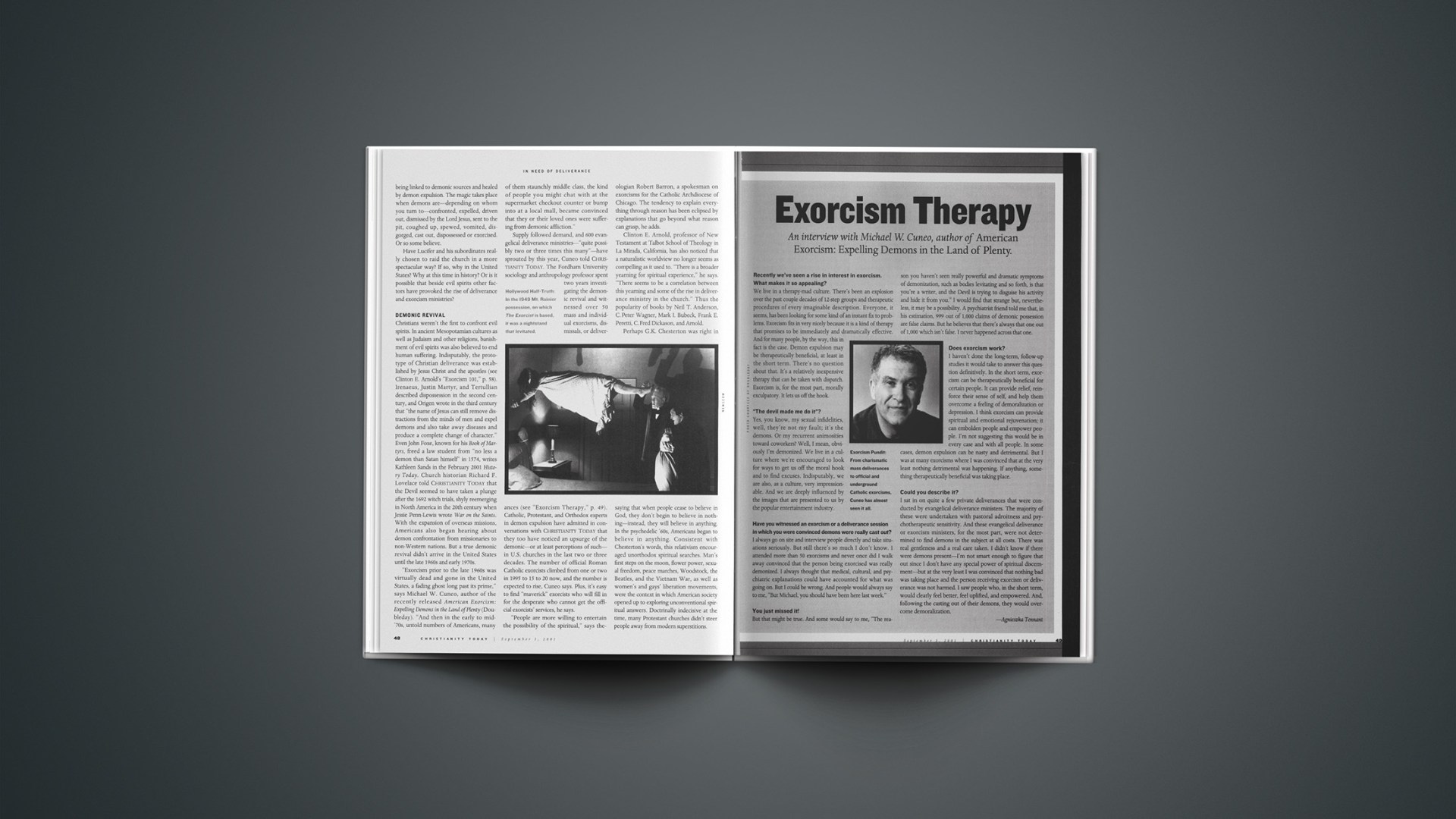Recently we’ve seen a rise in interest in exorcism. What makes it so appealing?
We live in a therapy-mad culture. There’s been an explosion over the past couple decades of 12-step groups and therapeutic procedures of every imaginable description. Everyone, it seems, has been looking for some kind of an instant fix to problems. Exorcism fits in very nicely because it is a kind of therapy that promises to be immediately and dramatically effective. And for many people, by the way, this in fact is the case. Demon expulsion may be therapeutically beneficial, at least in the short term. There’s no question about that. It’s a relatively inexpensive therapy that can be taken with dispatch. Exorcism is, for the most part, morally exculpatory. It lets us off the hook.
“The devil made me do it”?
Yes, you know, my sexual infidelities, well, they’re not my fault; it’s the demons. Or my recurrent animosities toward coworkers? Well, I mean, obviously I’m demonized. We live in a culture where we’re encouraged to look for ways to get us off the moral hook and to find excuses. Indisputably, we are also, as a culture, very impressionable. And we are deeply influenced by the images that are presented to us by the popular entertainment industry.
Have you witnessed an exorcism or a deliverance session in which you were convinced demons were really cast out?
I always go on site and interview people directly and take situations seriously. But still there’s so much I don’t know. I attended more than 50 exorcisms and never once did I walk away convinced that the person being exorcised was really demonized. I always thought that medical, cultural, and psychiatric explanations could have accounted for what was going on. But I could be wrong. And people would always say to me, “But Michael, you should have been here last week.”
You just missed it!
But that might be true. And some would say to me, “The reason you haven’t seen really powerful and dramatic symptoms of demonization, such as bodies levitating and so forth, is that you’re a writer, and the Devil is trying to disguise his activity and hide it from you.” I would find that strange but, nevertheless, it may be a possibility. A psychiatrist friend told me that, in his estimation, 999 out of 1,000 claims of demonic possession are false claims. But he believes that there’s always that one out of 1,000 which isn’t false. I never happened across that one.
Does exorcism work?
I haven’t done the long-term, follow-up studies it would take to answer this question definitively. In the short term, exorcism can be therapeutically beneficial for certain people. It can provide relief, reinforce their sense of self, and help them overcome a feeling of demoralization or depression. I think exorcism can provide spiritual and emotional rejuvenation; it can embolden people and empower people. I’m not suggesting this would be in every case and with all people. In some cases, demon expulsion can be nasty and detrimental. But I was at many exorcisms where I was convinced that at the very least nothing detrimental was happening. If anything, something therapeutically beneficial was taking place.
Could you describe it?
I sat in on quite a few private deliverances that were conducted by evangelical deliverance ministers. The majority of these were undertaken with pastoral adroitness and psychotherapeutic sensitivity. And these evangelical deliverance or exorcism ministers, for the most part, were not determined to find demons in the subject at all costs. There was real gentleness and a real care taken. I didn’t know if there were demons present—I’m not smart enough to figure that out since I don’t have any special power of spiritual discernment—but at the very least I was convinced that nothing bad was taking place and the person receiving exorcism or deliverance was not harmed. I saw people who, in the short term, would clearly feel better, feel uplifted, and empowered. And, following the casting out of their demons, they would overcome demoralization.
Copyright © 2001 Christianity Today. Click for reprint information.
Related Elsewhere
See today’s related articles on deliverance:Possessed or Obsessed? | Many Christians say they are in need of deliverance but some may be giving demons more than their due.
Alter Possession | Some “demons” are better left unexorcised.
Pandora’s Box of SRA | Satanic ritual abuse is often hard to prove, but it may not matter.
Exorcism 101 | What we can learn from the way Jesus cast out demons?
Learning English From MTV | Inside Agnieszka Tennant’s article on deliverance ministries.
Michael W. Cuneo’s American Exorcism: Expelling Demons in the Land of Plenty will be published in September by Doubleday, but can be preordered from Amazon.com and other book retailers.
Fordham University has contact information for Cuneo, but it’s up to the University of Dayton (where Cuneo taught for a semester in 1999) to offer a biographical sketch.
First Things, Crisis, and The New York Times Book Review offer reviews of Cuneo’s earlier book, The Smoke of Satan: Conservative and Traditionalist Dissent in Contemporary American Catholicism. The New York Times Book Review also offers the book’s first chapter. The book was also recommended by Richard Mouw in Books & Culture.










